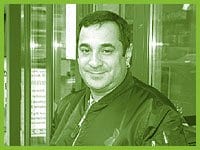Jorge da Costa’s eyes light up when talking about the Portuguese- speaking group Arco Iris. It’s not hard to recognize the pride he feels towards the group’s six years of working to achieve acceptance.
Fusing their lives as gay and lesbian people with their Portuguese heritage has often been made harder by negative attitudes within Portuguese culture.
“As Portuguese gay men, we were left out of the Portuguese community because of very strong attitudes that you cannot be gay,” says the 46-year-old da Costa, who was elected president in October.
Portuguese culture, even in urban Toronto, can be still rooted in tradition and machismo.
“We needed a comfortable space to be and to be comfortable about who we are,” says da Costa, who emigrated from Portugal in 1968. “It’s very hard to be disowned from the community when in your heart you are Portuguese.”
Da Costa knows that feeling all too well, having been disowned by his own family for being gay. Da Costa first became open about his sexuality after his partner died in 1994. Even though he had been involved with a local Portuguese-language Catholic church from the time he was a little boy, he was given a cold shoulder by the clergy and the congregation there after his coming out. With no one to talk to, da Costa looked up Arco Iris.
Founded by several women in 1996, the group made its first appearance in that year’s Pride parade and has grown to 240 members since then.
Although da Costa didn’t march then, the event made him realize how important it was for queer Portuguese people to be open and visible. He became involved in the group’s social committee, helping organize dances and dinners.
“Since I made that decision, I’ve grown stronger,” says da Costa, who has been living with HIV for 18 years. “I’ve learned to believe more in myself as a Portuguese gay man.”
Arco Iris has gone through some rough spots. In the summer of 1997, a Portuguese radio station aired a discussion show on Pride. During the show, a caller said all Portuguese homosexuals should be dead and if he had a machine gun, he would go and shoot them. This prompted the group to call for a press conference in Nathan Phillips Square.
“We said we were not going to tolerate this. After that we became more visible. We got lots of support from the community,” says da Costa.
The group received apologies from the radio station and congratulations from people in the community on their courage to stand up for themselves.
This event made members realize there was still a lot of hatred towards them and the only way to break through that would be to gain acceptance within the community.
In 1999, Da Costa and fellow members Rui Pires and Michelle Rais-Amores approached the Alliance Of Portuguese Clubs And Associations Of Ontario, the organization that governs the interests of Portuguese groups in the province. They wanted membership, like the Polish Lesbian And Gay Association Of Toronto had won in the Canadian Polish Congress in the early 1990s.
“One of our messages was that we were their children and we needed to get back into this community to get accepted.”
After their presentation, the three of them waited outside anxiously while the group voted.
“When we were called back in, everyone was clapping and saying welcome,” says da Costa.
Alliance president Jose Eustaquio says that day opened many doors for everyone involved.
“I think the involvement of Arco Iris in the alliance has been pivotal in the re-education process,” he says.
Acknowledging this Portuguese diversity played a role in electing Rui Pires as vice president of the alliance.
Pires, who is also secretary for Arco Iris, is the first openly-gay man to sit on the board, and he says he can see how their acceptance illustrates changing attitudes in Portuguese culture.
“I think the key is they’ve seen a group out there doing a lot of work for the community,” says Pires.
Da Costa says creating a presence within other alliance clubs will help people who are questioning their sexuality understand it’s okay to come out.
This past summer, Arco Iris celebrated its sixth anniversary with crossover events along with Portuguese Day. Da Costa says it allowed gay and lesbian people to experience the music, food and culture that is Portugal – and vice versa. Seeing Portuguese women as old as his mother, dressed in folklore costumes, dancing with gay men made a definite impact.
This coming March da Costa and his vice-president travel to Lisbon, Portugal to meet eight gay organizations and participate in workshops about what it’s like to be a gay immigrant.
“That’s one of my dreams to communicate with all those groups,” da Costa says.
The group’s also contributing to celebrations in May for the 50th anniversary of Portuguese immigration to Canada.
* For more info about Arco Iris, contact arcoiristoronto@yahoo.com.

 Why you can trust Xtra
Why you can trust Xtra


